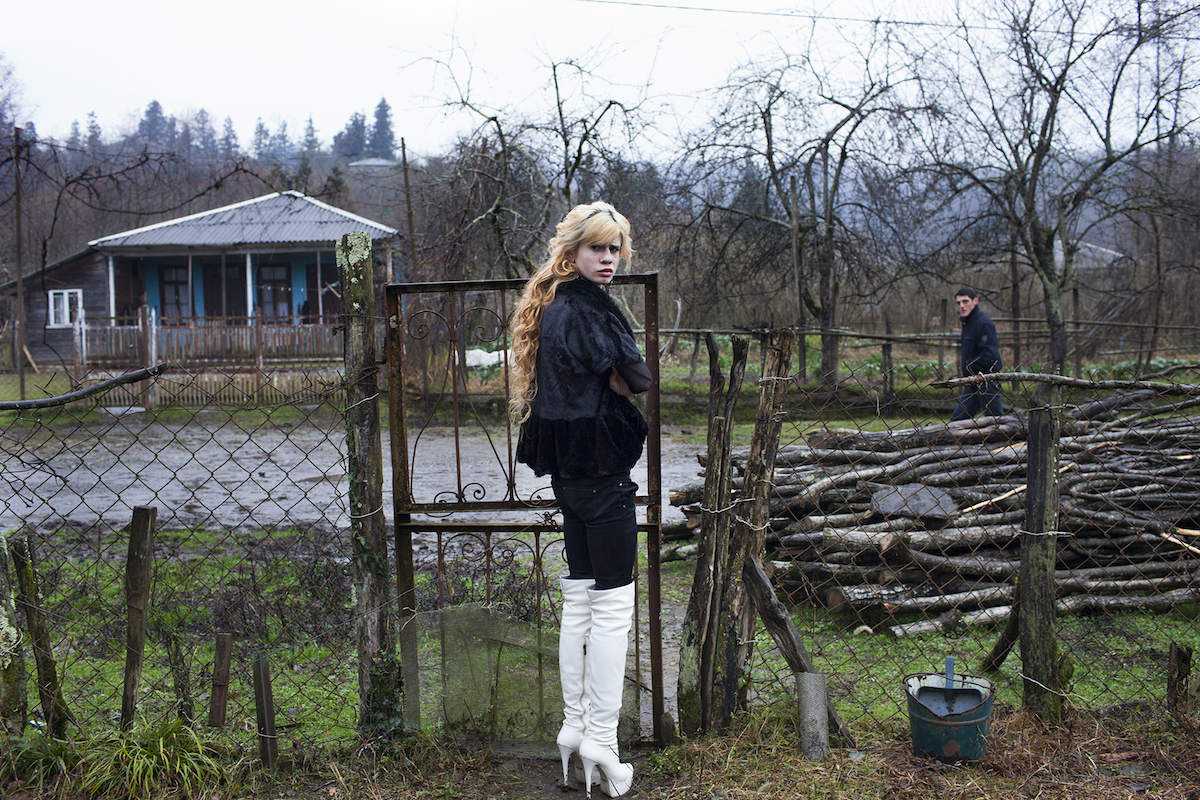
Transgender woman Kesaria Abramidze murdered in Tbilisi
On September 18, a day after the Georgian parliament passed a homophobic law on the protection of family values, transgender woman Kesaria Abramidze was murdered in Tbilisi.

In the morning, the police released information about the arrest of a suspect, stating that a 26-year-old man, “following a conflict,” inflicted multiple stab wounds on the woman in her apartment before fleeing the scene.
A criminal case has been opened under the article for premeditated murder with aggravating circumstances based on gender hatred.
TV channels aired surveillance footage from the building, showing the suspect exiting the elevator about 14 minutes after entering.
- Georgian Parliament passes homophobic law banning LGBT “propaganda”
- The history of Georgia’s LGBT+ community’s struggle for equal rights and non-discrimination
Kesaria Abramidze was one of the first transgender women in Georgia to publicly speak about her gender identity. She was an actress, model, and TV host, frequently discussing her experiences on various shows.
Shortly after her murder, a social media post by Kesaria, made several months earlier, began circulating. In it, she revealed that she had been a victim of manipulation and violence for two years, which had prompted her to leave the country for a time.
She also mentioned suffering a concussion due to violence from her partner.
Neighbors and friends confirmed the abuse. Kesaria’s friend, Iakob Mamulia, told the “Mtavari Arkhi” TV channel that the accused “was one of the ‘thugs’ who used violence against peaceful protesters during the April 2024 demonstrations against the ‘foreign agents’ law.“
“When she saw that, she broke off the relationship with him and even left the country. She later returned, but he didn’t calm down.
I heard with my own ears how he told Kesaria that she was to blame for everything. He said, ‘I’m going crazy because of you, and others are telling me that I’m involved with a “fake” woman.’ When I saw that post [on Kesaria’s social media, where she appeared with the suspect—later, the post was deleted], I thought something had been resolved.
This guy told her that no one else mattered to him, that she ‘had to be his,’ and that he must marry her. But he kept repeating that it was all her fault,” Mamulia shared in an interview with Mtavari Arxi.
On June 10, Kesaria wrote on her Facebook page: ‘If you don’t have wings, at least let me fly.’”

The case of the murder of Kesaria Abramidze and political responsibility
Experts claim that over the years, there has been an increasing spread of hate propaganda by the Georgian government towards people who identify as LGBT.
“When the government and propaganda-driven media fuel the already high levels of transphobia in society, it directly affects how community members view themselves, as well as how their partners treat them. This amplifies internalized homophobia/transphobia,” human rights advocate Elene Kakhosroshvili told JAMnews.
“As a result, a conscious or subconscious belief is reinforced that queerness and queer relationships are unacceptable.
Kesaria was the most prominent transgender woman in Georgia, the first to openly speak about her identity, including her transition. It’s impossible not to connect her murder with the discussions surrounding the new law. After all, she was killed just 24 hours after it was passed,” says Elene.
She explains that from the moment the initiative was introduced, human rights advocates anticipated a rise in societal hatred.
“The main slogan, repeatedly echoed by government officials and the ruling party, was overtly transphobic: ‘A woman should be a woman, and a man should be a man.’
This law especially impacts trans people by restricting their access to healthcare and stripping them of rights, including the recognition of their true gender.“
She believes that now Georgian Dream is trying to avoid responsibility by framing the murder as femicide—committed by a partner—without acknowledging its connection to her being transgender.
“Femicide does not rule out transphobic motives. Kesaria was a transgender woman—everyone knew this, including her partner. She posted a photo with him, then it quickly disappeared, and she was killed almost immediately after. All of this heightens suspicions of transphobia.
The narrative from the authorities, claiming the murder was committed by her partner, suggests that the crime isn’t related to transphobia and therefore isn’t a result of the law and the heated debates surrounding it.
Firstly, this is a naive attempt to avoid responsibility.
Secondly, it’s a shallow argument to say that just because a trans woman was killed by her partner, transphobia isn’t involved.
It’s wrong to assume that such a large-scale homophobic and transphobic campaign by the authorities wouldn’t affect community members and their partners,” says Elene.
“Legalizing fascist hatred in Georgia”
Queer organizations operating in Georgia claim that this crime was committed out of gender-based intolerance, a result of recent policies aimed at devaluing the lives of LGBTQ+ people.
“The law, which institutionalizes censorship and hatred, has made the LGBTQ community, especially transgender people, a prime target. The business elite, often referred to as parliamentarians thanks to their ties with Russian oligarchs, have chosen a path of social isolation. Instead of focusing on public welfare, the past 12 years have been dedicated to sowing division, hatred, and policies that weaken and impoverish families,” stated the NGO Movement for Equality.
The Women’s Initiatives Support Group (WISG) stated that “the brutal murder of a transgender woman, immediately following the passage of a fascist anti-LGBT law, has become a tragic symbol of this malicious decision. It is a direct result and a clear example of what happens when fascist hatred is legalized.“
The murder of Kesaria is both transphobia and femicide
“Tbilisi Pride” also emphasizes that the shocking circumstances of Kesaria’s murder are linked to both transphobia and femicide. “It is horrific that systemic hatred, born from political games, leads to the destruction of a unique and invaluable life,” the organization stated.
“Our community’s life in Georgia is one of existing from tragedy to tragedy, living in fear of who will be next. Systemic hatred inevitably leads to violence, leaving marks on our bodies. The harmonious cooperation between the state and perpetrators results in such tragic outcomes. The regime that fosters and supports this must be removed from power,” said Tbilisi Pride.
The organization demands appropriate measures from the ombudsman, civil and political groups, as well as relevant state institutions.
The Ministry of Internal Affairs is obligated to involve independent experts and representatives from Georgia’s strategic partner countries to effectively investigate and prevent future hate crimes, the organization stated.
“We call on everyone with any influence to join the fight against hatred. Kesaria was destroyed by fascist policies. We must adhere to a policy of solidarity. We will fight and do everything possible to ensure that no government in Georgia dares to play with human lives again,” said Tbilisi Pride.
The queer association “Temida” stated that “the wave of hatred coming from politicians today incites violence in society, and the new law has legalized that violence.“
“It is hard to believe that the Georgian police, especially after the passage of the new law, will investigate this case quickly and impartially,” the organization noted, joining the call for the Ministry of Internal Affairs to involve independent experts, including representatives from Georgia’s partner countries, in the investigation.
The organization also urged the ombudsman to take full control of the investigation.
Civil organizations are also addressing political homophobia and gender inequality. According to PHR, these issues are the root cause of Kesaria’s murder.
“Hatred policy by authorities leads to the marginalization of LGBTQ+ people”
The Center for Social Justice has stated that there is a direct link between the use of hate language in political rhetoric and hate-motivated violence.
“For nearly a year, the ‘Georgian Dream’ government has aggressively employed homophobic, biphobic, and transphobic language, cultivating it through mass propaganda. This has become the official discourse and ideology of those in power, most clearly demonstrated in the adoption of anti-LGBTQI fascist legislation.
It is evident that the politics of hatred leads to severe consequences—oppression, marginalization of LGBTQ+ people, and violence against them. The case of the murder of Kesaria Abramidze cannot be understood without considering this troubling broader context,” the organization stated.
The President of Georgia responded to Kesaria Abramidze’s murder on Facebook.
“Hate gives the enemy the power to weaken and divide us. The death of this beautiful young woman should serve as a signal for us to humanize and Christianize. Let this tragedy not be in vain!” wrote Salome Zurabishvili.
What restrictions does the new law impose
On September 17, 2024, the ruling party “Georgian Dream” passed a law titled “On Family Values and the Protection of Minors,” which strips queer people of their rights and introduces censorship.
The law defines existence solely in terms of biological sex (at birth) as male and female. According to the text of the law:
● Information or actions will be considered prohibited propaganda “if, in the opinion of an objective observer, this information/action represents an identity that does not align with either biological sex and/or an identity that differs from one’s biological sex.”
● Prohibited propaganda will include “positive or imitative depictions of sexual relationships between individuals of the same biological sex or incest.”
● When assessing information or actions, their content, form and type, method, time and place, as well as the circumstances under which they were disseminated (provided to others), and the audience for whom this information/action was intended will be taken into account.
● The law prohibits same-sex marriages, which were already banned in Georgia.
● Adoption of children by same-sex couples is forbidden.
● Surgical procedures for transgender transition or any other type of medical interventions on individuals are prohibited.
● The law prohibits legal recognition of a changed gender.
● The right to assemble and demonstrate against “prohibited propaganda” is restricted. The dissemination of information that the authorities classify as “propaganda” is banned for broadcasters and educational institutions, including universities.
● The provision of such information to minors through direct communication, including the exchange of creative works or access to them, is prohibited. “Providing access means instances where ‘the subject allowed a minor into the territory where this information is disseminated orally, using sound devices and/or visually, if the subject had the ability to restrict the minor’s access to that territory.’”
● In case of violations of the homophobic law by Georgian authorities, both administrative and criminal liability are stipulated.
● The law establishes that May 17, known as the International Day Against Homophobia, Biphobia, and Transphobia, will be observed in Georgia as the Day of Family Sanctity and Respect for Parents.
It is noteworthy that this day was instituted by Ilia II, the Patriarch of the Georgian Orthodox Church, in 2014—following the violence and attacks by clergy and parishioners against a peaceful LGBTQ+ pride march in 2013. At that time, “Georgian Dream” and the government failed to protect the freedom of expression of civilians.
In the past 10 years, at least six transgender women have died violent deaths
Homophobia, biphobia, and transphobia have been longstanding issues in Georgia, but they are now further exacerbated by the government’s political campaign.
Queer people in the country face persecution, oppression, psychological and physical violence, and murder.
Over the last decade, at least six transgender women have been killed or died under mysterious circumstances:
Sabi Beriani — 2014
Bianca Shigurova — 2016
Zizi Shekeladze — 2016
Lika Kontselidze — 2018
Liza Kistauri — 2023
Kesaria Abramidze — 2024
Additionally, crimes and murders based on gender remain a significant issue.
According to the report by the Public Defender, in 2023, 24 women were killed in Georgia, and there were 27 attempted murders of women.
In 2024, many cases of femicide have also come to light.

